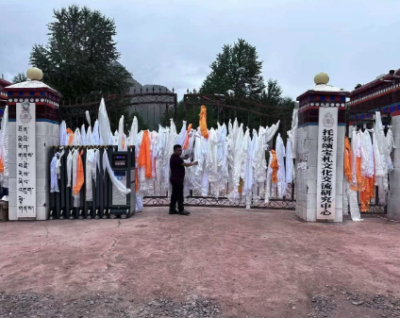In July, 110 students graduated from Gangjong Sherig Norbu Lobling School on the Tibetan Plateau in Golog prefecture, Qinghai province. Despite the celebratory occasion, tears marked their faces.
For months, authorities had sought reasons to close the school, exploring various legal avenues. Until this summer, they had been unsuccessful.
Eventually, despite the school’s legal victories, the regional administration ordered its closure. Gen Jigme Gyaltsen explained that the school was shut down for not meeting the Qinghai Provincial Party Committee’s vague standards for vocational schools. No further details were provided.
Founded in 1994 in the Golog Tibetan Autonomous Prefecture, the Tibetan school gained international acclaim for its rich curriculum in Tibetan cultural and linguistic studies. It attracted youth from Tibet, Mongolia, and Inner Mongolia.
The school emphasized preserving Tibetan language studies, medicine, and Buddhist philosophy, receiving support from Finland and the Netherlands. Its rigorous curriculum included computer science, engineering, medicine, filmmaking, and physical education.
The International Covenant on Civil and Political Rights has similar terms, though China hasn’t ratified it.While children under 18 were not present at Gangjong Sherig Norbu Lobling, former students face limited options for higher learning in Tibetan. Opportunities to study in Tibetan are dwindling from kindergarten to university.
At the Tibet Policy Institute’s July roundtable, Shede Dawa of Tibet Watch highlighted the school’s growth and its role in reconnecting students with their heritage, despite the region being referred to as an “open air prison.”
The roundtable participants felt the impact of Dawa’s upbringing in his sincere advocacy for peers facing academic repression.
Gazing at the scholars and locking eyes with the camera, he emphasized the school’s founder’s words: preserving the Tibetan language and script is vital for the Tibetan people’s survival. Stories, cradled by linguistic exchange, ensure survival.
Dr. Lobsang Yangtso, from the International Tibet Network, admired the courage of alumni like Shede Dawa, who risk retaliation for speaking against the school’s closure. “There are many others like him,” she noted.
In recent years, human rights monitors have noted the gradual replacement of Tibetan textbooks with Chinese ones.
A 2010 cultural assimilation policy mandates that all schools in Tibet use Chinese as the primary language, starting from kindergarten. Dawa Tsering, director of the Tibet Policy Institute, explained the community’s struggles:
“The Chinese government is closing monasteries and Tibetan schools as part of a broader strategy to eradicate Tibetan language and culture.”
Tibetan activists argue that private schools are especially targeted in “patriotic education campaigns,” making language instruction harder to monitor. Eight of the remaining 16 private Tibetan schools have been ordered to close, while the rest face allegations and administrative pressure.
The legal battle began with scrutiny of a logo used by the Pure Native Language Association, a student group at the school.
In 2018, Tibet Times reported that student leaders were sued for using images of a jewel and snow lion, symbols of refuge and unity. Allegations claimed the logo emulated the Tibetan national flag, banned in Tibet since the 1960s, providing grounds for an investigation.
For exiled Tibetans, the flag symbolizes freedom from oppression. To the Communist Party, it signifies separatism, leading to arrests and torture for possessing its image.
When initial suspicions yielded no results, the Communist Party adopted a new strategy to diminish the school’s influence.
According to sources from the Central Tibetan Administration, Gangjong Sherig Norbu Lobling faced a series of legal challenges.
The Qinghai provincial government conducted a “search and interrogation” to find grounds for penalizing the school for hosting monks or nuns under 18, which is illegal under Chinese law.
If discovered, authorities reportedly forced these students to leave their monasteries and undergo “patriotic education.”
Hundreds of Gangjong Sherig Norbu Lobling graduates have become researchers, government leaders, teachers, and entrepreneurs.
The school has been a source of Tibetan leadership since its inception. Founder Gen Jigme Gyaltsen, who left nomadic life to establish the school, was honored as a “Zhonghua Charity Worker” and received the “National People’s Education Award.”
Despite facing corruption allegations due to his roles in the Qinghai Tibetan Chamber of Commerce and Tibet Nomadic Management Office, he was cleared of all charges on June 28.
Editor-in-Chief of the Tibet Times, Pema Tso, noted that despite increasing challenges since the 2008 protests, the school community was “relieved” by a provincial court decision allowing its operation to continue.
However, the rule of law was ultimately subverted. On July 14, Gyaltsen announced the school’s closure due to non-compliance with Qinghai Provincial Party Committee’s vocational school standards, without specifying the violations.
The closure, revealed during the last graduation ceremony, created uncertainty for future scholars and professors. A former student’s sister was arrested for allegedly spreading “misinformation” about the shutdown, and her whereabouts remain unknown.
Under international law, China must allow young Tibetans to pursue education in their preferred language. The United Nations Convention on the Rights of the Child (UNCRC), ratified by China in 1992, states that minority children have the right to use their own language.
When questioned about how states can show support for Tibetan youth deprived of their linguistic heritage, Tempa Gyaltsen Zamlha, Deputy Director of the Tibet Policy Institute, made a straightforward appeal: “Bring attention to the matter.”
The International Covenant on Civil and Political Rights has similar terms, though China hasn’t ratified it.While children under 18 were not present at Gangjong Sherig Norbu Lobling, former students face limited options for higher learning in Tibetan. Opportunities to study in Tibetan are dwindling from kindergarten to university.
Tibet Watch reports that Dzoge County recently ordered 300 young monks at Taktsang Lhamo Kirti Monastery to disrobe and become lay students at government schools. An undisclosed source indicated that Dzoge County authorities plan to close the monastic school this month.
Ironically, while China shuts down Tibetan schools, it claims that the lack of education opportunities necessitates sending Tibetan children to distant boarding schools.
In June, Xi Jinping visited such a school in Qinghai’s provincial capital, which included 800 Tibetan students from the same area as Gangjong Sherig Norbu Lobling.
Lhadon Tethong, founder of Tibet Action Institute, criticized this hypocrisy: “Claiming Tibetan children must live in boarding schools due to remote geography, while closing an acclaimed school in a remote region, exposes China’s justification as a lie.”On July 29, 100 academics petitioned the UN High Commissioner for Human Rights to pressure China to comply with international education standards.
When questioned about how states can show support for Tibetan youth deprived of their linguistic heritage, Tempa Gyaltsen Zamlha, Deputy Director of the Tibet Policy Institute, made a straightforward appeal: “Bring attention to the matter.”









Comment